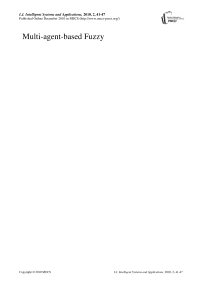Multi-agent-based Fuzzy Dispatching for Trucks at Container Terminal
Автор: Meng Yu, Yanwei Zhang
Журнал: International Journal of Intelligent Systems and Applications(IJISA) @ijisa
Статья в выпуске: 2 vol.2, 2010 года.
Бесплатный доступ
At container terminals, containers are transported from the marshalling yard to the quay and vice versa by Container Trucks (CTs). This study discusses how to dispatch CTs by utilizing information about pickup and delivery locations and time in future delivery tasks based on dynamic dispatching strategy in which multiple tasks are matched with multiple CTs. n this paper, Multi-agent system (MAS) is used as the basis for an intelligent dispatch system. To aim at that the characteristic of management of container terminal is how to optimize resource of terminal, the trends of decision-making way for management of container terminal, research and application of Multi-Agent system is summarized. Relationship between transport tasks and service of CTS has been taken as a contract net using the fuzzy set theory and method. Considering the load of communication and consultation efficiency in system, the bidirectional negotiation mechanism is adopted. The dispatching model based on Contract Network Protocol (CNP) using bidirectional negotiation is provided for assigning optimal delivery tasks to CTs and fuzzy reasoning process of dispatching decisions is suggested. The method has both virtues of precision of static planning and flexibility of CNP and has been confirmed by cases.
Terminal, Container Truck Dispatching, Contract Net Protocol, Fuzzy control, Multi-Agent System
Короткий адрес: https://sciup.org/15010146
IDR: 15010146
Список литературы Multi-agent-based Fuzzy Dispatching for Trucks at Container Terminal
- QIAN Yong-xing, Truck Process System of Container Terminals. Port & Waterway Engineering. No.5,2005, pp.62-66.
- Meng Yu and Shaomei wang. Study on Scheduling System Based on Multi-Agent of Container Terminal. Proceedings 2006 10th International Conference on Computer Supported Cooperative Work in Design 2006,pp.579~584.
- ZENG Qing-cheng and YANG Zhong-zhen, A scheduling model and Q-learning algorithm for yard trailers at container terminals, Journal of Harbin Engineering University, Vol.29,No.1,2008,pp1-4.
- De Koster R, Le-Anh T and Vander Meer J R. Testing and classifying vehicle dispatching rules in three real-world settings, Journal of Operations Management, No.22,2004, pp.369-386.
- Huynh, Nathan, Walton and C. Michael, Robust scheduling of truck arrivals at marine container terminals, Journal of Transportation Engineering, No.134,2008, pp. 347-353.
- Vu Duc Nguyen and Kap Hwan Kim, A dispatching method for automated lifting vehicles in automated port container terminals, Computers & Industrial Engineering, Vol.56 No.3, 2009, pp1002-1020.
- Li Bin, Li Wenfeng and Zhang Yu, Agent-based modeling and simulation for vehicle dispatching at container terminals. Journal of System Simulation,No.20,2008, pp.5158-5161.
- MA Jian-hong, WANG Wan-sen and JI Qiu, Multi-expert Agent cooperation based on ameliorated contract net, Computer Applications, Vol.24 No.11, 2004,pp.47-49.
- LIAO Qiang , ZHOUKai and ZHANG Bopeng, “Research on Job-Shop Dynamic Scheduling Problem Based on Field Bus and Multi-Agent”, Chinese Mechanical Engineering, July,2000,11(7),pp.757-760.
- DEGANO, C.,PELLEGRINO, A, “Multi-Agent Coordination and Collaboration for Control and Optimization Strategies in an Intermodal Container Terminal”, IEEE International Engineering Management Conference (IEMC-2002), Cambridge, UK, IEEE.
- REBOLLO, M., JULIAN, V., CARRASCOSA, C.,BOTTI, V., “A Multi-Agent System for the Automation of a Port Container Terminal”, Autonomous Agents 2000 workshop on Agents in Industry., Barcelona,Spain.
- THURSTON, T., HU, H., (2002), “Distributed Agent Architecture Automation”, 26th International Computer Software and Conference , 2002, Oxford, UK. pp.81-90.
- Wen CHEN,Shilong WANG, HUANG He, “Research on ant colony algorithm for multi-agent based workshop dynamic scheduling”, Modular Machine Tool & Automatic Manufacturing Technique, 2004,06,pp.58-59,61.


